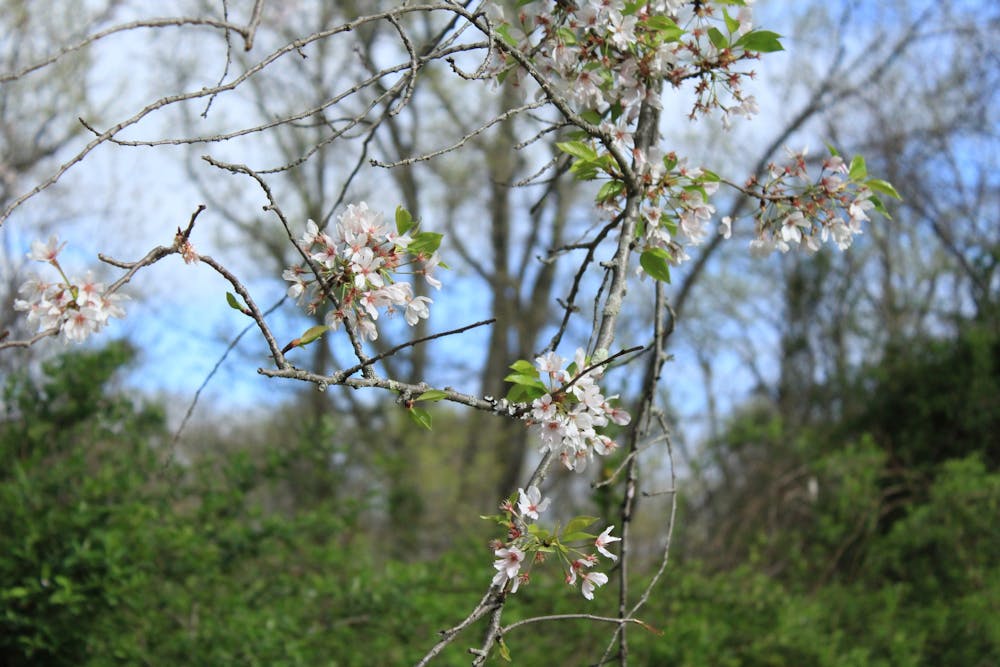Content Warning: The following article contains mention of death.
University Counseling services are available at 609-258-3141, and the Suicide Prevention Lifeline is available 24/7 at 988. A Crisis Text Line is also available in the United States; text HOME to 741741. Students can contact residential college staff and the Office of Religious Life for other support and resources. For employees, Carebridge counseling services are available 24/7 by calling (800) 437-0911.
On the afternoon of Jan. 30, students, staff, and faculty gathered in Robertson Hall to commemorate the life and accomplishments of first-year graduate student Maura Coursey. Coursey was found dead in her off-campus residence on Jan. 26.
Classmates and friends of Coursey filled nearly every chair in Arthur Lewis Auditorium as they shared heartfelt memories and stories.
The memorial was moderated by Maura’s friend and classmate Brontë Forsgren GS.
SPIA Dean Amaney Jamal began the memorial by thanking everyone for coming, expressing that the SPIA community is keeping those who knew Maura well in their hearts, and saying that Coursey was “loved by so many” and that “words can’t express this loss.” She reiterated that the University and SPIA will continue to provide support to the community in light of the loss.
Coursey’s passing is the fourth death of a Princeton student in the past nine months. Additionally, a University staff member died by suicide on campus in September.
Forsgren shared that she immediately connected with Maura as they both hailed from Utah. Forsgren said that she found out about their shared home state on the first day of Math Camp, when Dean Jamal asked if anyone was from a state not usually represented at SPIA and Coursey “immediately beat [her] to it.”

She shared how Coursey helped her navigate challenges as she was struggling with her own identity and described Coursey as “a safe space to land for so many.” According to Forsgren, Coursey’s sense of humor was felt by the whole Masters in Public Affairs (MPA) cohort, and said that Coursey was one to “always press send on a funny message to the group chat” and whose passion to “help others and those who are marginalized was so clear” in her work with domestic violence victims and refugees. Forsgren described her as having a “righteous but productive anger.”
Forsgren emphasized Coursey’s authenticity, explaining that Coursey was a lesbian woman from Salt Lake City, which Forsgren characterized as a place where it is not easy to be queer. Forsgren said that she “admired Maura for how proud she was of who she was.” For Forsgren, spending time together in Maura’s hometown of Salt Lake City over winter break taught her more about Coursey’s love for her family. Forsgren also mentioned Coursey’s love of Muay Thai, saying that Coursey wanted to one day go professional.
Following Forsgren, three friends who often played music with Coursey performed “Crowded Table” by The Highwomen in front of an emotional audience. According to one of the musicians, the song had particular significance to Coursey, who grew up in a folk music community. In the designated time allotted for audience stories and sharing, two hometown friends of Coursey who knew her since middle school, Mollie Karewa and Yarden Zamir, shared that she “was a really humble person with so many hidden talents.” Karewa and Zamir said that she was fluent in French, taught boxing to people with Parkinsons, and had a beautiful voice, all of which the two only found out about years after knowing Coursey.
Coursey had expressed to Karewa and Zamir that she was excited to be around people with similar intellectual interests as her at SPIA, something she didn’t experience at home. The two thanked the SPIA community for providing her with this community.

They emphasized that despite not living in the same place as Coursey since 2012, “it was so easy to connect with Maura” and they always found a way to talk, even when Coursey was studying abroad in France as an undergraduate through Skype.
A classmate of Coursey’s, Omar Elhaj GS, described their MPA class “as a symphony — when one instrument is missing, it doesn’t sound right.” He shared that Coursey’s steadfast nature would shine through in small actions, such as when she would sit outside a lecture in protest if she believed the lecture wasn’t helpful or eloquently express when she believed an important angle was missing from a precept discussion. He called on his class to embody Maura’s “productive anger” when they pursue their careers in public service.
Another classmate, Katherine Becker GS, explained that Coursey was someone people go to with the most “private, sensitive information and know that it was safe with her.” She continued to say that Coursey was a “renaissance woman” who “had so many dreams,” indulging the audience in Coursey’s fun and lighthearted desire “to take a road trip to all the lesbian bars left in the US” and her professional goal to learn Russian and work in Eastern Europe to better serve the communities she desired to serve.
Cherrita Guy GS, an MPA student in a different cohort, said that Coursey “wasn’t afraid to dream big.” Guy explained that as part of her SPIA education, she had met a group of Afghan refugees assigned resettlement in different US states. Discovering that one was assigned to Salt Lake City, Cherrita connected the refugee with Coursey, who helped the refugee feel at home. Cherrita explained that while working at the International Rescue Committee, Coursey “went above and beyond her job title,” taking on tasks that were normally suited for top executives.
The memorial closed with a slideshow of photos compiled by Coursey’s classmates. Cherrita said, “I remember thinking, this is someone who is going to change the world.” She continued, “Maura accomplished more in her short life than most people accomplish in their lifetime.”
Abby Leibowitz is a News contributor for the ‘Prince.’
Please direct any corrections requests to corrections[at]dailyprincetonian.com.








